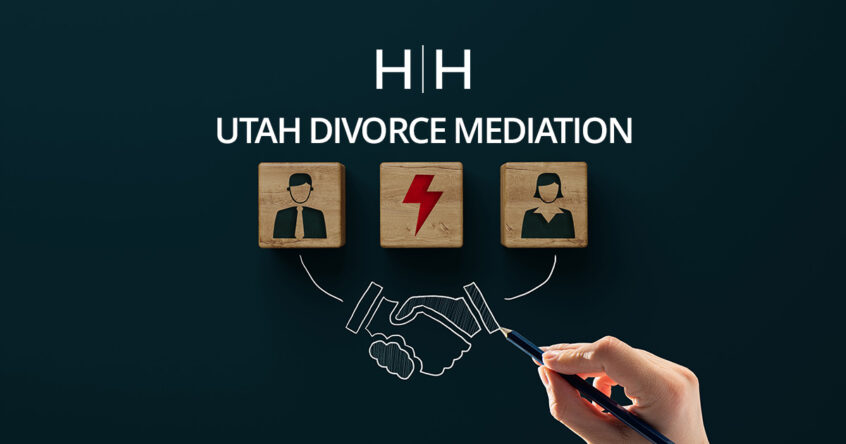When Is Divorce Mediation Not Recommended

In Utah, divorce is often a complex and emotional process. Most couples seek ways to make it smoother and less contentious. That’s where divorce mediation comes in. It’s typically the most attractive option for Utah couples because it allows you to work out the terms of your divorce outside of court.
Divorce mediation involves a neutral mediator who helps you negotiate issues like property division, child custody, and alimony. It is usually faster, less expensive, less stressful than going to court, and boasts an impressive 80% success rate.
That said, mediation is not suitable for every situation. There are several divorce cases in Utah where mediation might not work or even backfire.
Let’s explore such situations.
1. When There’s a History of Domestic Violence
Divorce mediation requires you and your spouse to have equal power in negotiations. But when domestic violence is involved, that balance doesn’t exist. A recent study shows that one in every three women in Utah (33.6%) experience some form of sexual violence, physical violence, and/or stalking by an intimate partner in her lifetime.
If your spouse has been physically, emotionally, or psychologically abusive, you are bound to feel intimidated during mediation. This power imbalance can make it hard for you to voice your needs. You may agree to unfair terms just to get this over with.
In such Utah divorce cases, mediation is not recommended as your safety is the most critical factor. Instead, you should hire a competent divorce lawyer to protect your rights and ensure safety and let the court system handle your divorce.
2. When There’s a History of Coercion or Manipulation
Some relationships involve one partner manipulating or controlling the other. This type of emotional abuse can create a similar imbalance in mediation as physical abuse. Sadly, 41.6% of Utah women experience psychological aggression, while 36.4% face coercive control.
If your spouse has a history of coercing or manipulation, divorce mediation could be ineffective or unfair. Your manipulative spouse may try to push you into agreeing to unfavorable terms. In other words, you might end up signing financial or child custody arrangements that don’t reflect your needs.
3. When Your Spouse Refuses to Disclose Financial Information
One key to successful divorce mediation is transparency. Both you and your spouse must fully disclose your finances, including income, debts, and assets, which helps the divorce mediator divide your assets equitably according to the Utah divorce laws.
However, if your spouse refuses to share this information or tries to hide it, mediation will not work. There’s no way to negotiate fair terms without an honest financial picture. For example, hiding assets could result in an unfair property division. The same goes for undisclosed debts.
If you aren’t aware of the full financial picture, you can’t make informed decisions during mediation, which could affect your future in the long run. In such Utah divorce cases, court intervention might be necessary to ensure fair distribution of the assets.
4. When Your Spouse Is Unwilling to Compromise
Divorce mediation only works if both parties are willing to compromise. That means your spouse must also be willing to compromise to find a fair solution, whether it’s about your assets, debts, child custody, or alimony.
Mediation will likely fail if your spouse refuses to budge or demands unreasonable terms. For example, if your spouse insists on sole custody without considering your parenting role, mediation can’t move forward. The goal here is to find a middle ground, and when one of you is unwilling to do that, the court may need to intervene.
5. When There Are Mental Health or Addiction Issues
Utah is one of the most substance abuse-ridden states in the country. If your spouse is struggling with drug abuse or mental health issues like severe depression or anxiety, divorce mediation may not be an option.
Whether it’s drug abuse or mental health, with their judgment impaired, your spouse cannot make sound decisions when faced with divorce mediation. It can also be difficult to reach fair agreements on child custody and support if your spouse is struggling with addiction or mental illness.
In such Utah divorce cases, the court system might be a better way to address these concerns. We recommend hiring a skilled divorce attorney to protect your rights and ensure the safety of your children.
6. When There’s a High Level of Conflict
Divorce mediation is intended for Utah couples who can communicate, at least to some extent. If your relationship is marred with anger, resentment, and constant fighting, mediation will likely be ineffective.
High-conflict divorces often involve shouting matches or even aggressive behavior. If you can’t have a calm conversation with each other without it turning into an argument, mediation won’t work.
The divorce mediator can’t force you or your spouse to agree or communicate respectfully. They are not your therapist or marriage counselor either. Such divorce cases in Utah typically end up in the court, where the judge decides the final divorce settlement agreement.
7. When Legal Issues Are Too Complex
In some Utah divorce cases, the legal issues are too complicated for mediation. For example, you and your spouse may own a business together, have joint assets overseas, or have substantial joint investments and retirement funds.
Additionally, if you have signed a prenuptial or postnuptial agreement, that can complicate things. If you disagree over the validity of the agreement or any other issues, you might want to opt out of mediation. It may not be the best way to handle your divorce.
8. When There’s a Significant Power Imbalance
Even without abuse or manipulation, some relationships may naturally have a power imbalance. In these situations, your spouse may be more assertive or financially savvy than the other. This imbalance can make it hard for you to negotiate effectively.
For example, if your spouse has always handled the finances while you stayed home with the children, the spouse with less financial knowledge might not feel confident during mediation.
If you are sailing in this boat, we recommend hiring a reliable divorce mediation attorney in Utah immediately. Your lawyer can help protect your rights and ensure a fair settlement.
The Bottom Line
Mediation can be a great option for many Utah couples going through a divorce. It’s typically faster, less expensive, and less stressful than going to court. However, it’s not always the best choice. In cases involving abuse, manipulation, refusal to disclose financial information, or a significant power imbalance, mediation is not recommended. Additionally, high levels of conflict, mental health issues, or complex legal matters may require the court’s involvement.
If you’re considering mediation, you’ve got to evaluate your situation carefully. Henriksen & Henriksen can help you assess your situation and take the best foot forward. Contact our divorce mediation attorneys in Utah today!
